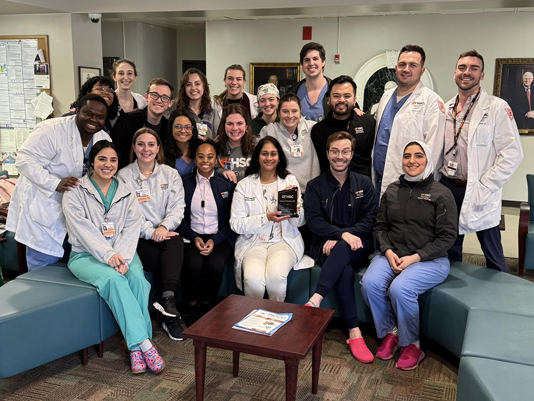Residency
Welcome to Our Residency Program!
We’re thrilled that you're considering our residency program—a place where clinical excellence, compassionate care, and personal growth converge. Whether you’re just beginning your search or narrowing down your top choices, we invite you to explore what makes our program exceptional. For any questions, don’t hesitate to reach out to our friendly and knowledgeable Program Manager at podom@uthsc.edu.
Why Choose Us?
 This is an exciting time to join our program. Since Dr. Ramona Phinehas stepped into
the role of Program Director in April 2022, we’ve embraced a period of vibrant transformation.
Under her leadership—and with the dynamic vision of Dr. Alexa Swailes, our newest
Associate Program Director—we’ve introduced innovative changes that elevate our residents’
experience both in and out of the clinical setting.
This is an exciting time to join our program. Since Dr. Ramona Phinehas stepped into
the role of Program Director in April 2022, we’ve embraced a period of vibrant transformation.
Under her leadership—and with the dynamic vision of Dr. Alexa Swailes, our newest
Associate Program Director—we’ve introduced innovative changes that elevate our residents’
experience both in and out of the clinical setting.
We’ve expanded our faculty to include experts in academic medicine and research, appointed a dedicated Research Director, and increased the size of our resident cohort—creating more collaborative, energized teams. Most importantly, our residents are thriving. Their happiness, engagement, and personal development are at the heart of everything we do.
People with a United Purpose
Our faculty and residents reflect a broad spectrum of backgrounds and experiences, all united by a commitment to improving women’s health in underserved communities throughout Tennessee. As a resident here, you'll be part of a mission-driven team focused on delivering innovative, patient-centered care with empathy and excellence.
A Rich and Varied Training Experience
We offer hands-on training across both public and private hospital settings, private practices, and specialized clinics. From early on, you’ll gain exposure to a wide range of patient populations and clinical scenarios. Our growing selection of electives—including those beyond the Memphis-Shelby County area—offers residents the flexibility to tailor their experiences based on their passions and career goals.
You’ll rotate through all the major subspecialties: Gynecologic Oncology, Maternal-Fetal Medicine, Reproductive Endocrinology and Infertility, and Urogynecology. Regional One Health—our primary training site—is a High-Risk Obstetrics Center of Excellence, and home to a new Gynecologic Oncology practice led by renowned physician Dr. John Schorge. We’ve also expanded our Center for High-Risk Pregnancy, Menopause Clinic, and HRA-based HPV/Dysplasia care.
Innovation in Learning
In addition to comprehensive subspecialty training, residents enjoy access to nontraditional learning experiences such as transgender care, pelvic floor therapy, birthing center care, obstetric genetics, critical care in oncology, and pediatric/adolescent gynecology. Exposure to midwifery care is also part of our curriculum.
We currently offer fellowships in Maternal-Fetal Medicine and Gynecologic Oncology, and our new Reproductive Endocrinology Fellowship. All our fellowships are ACGME accredited and offer an exceptional fellowship experience.
Resident-Centered Culture
We believe the best training happens when residents feel supported, heard, and empowered. Our leadership team takes resident feedback seriously, continually refining the curriculum and clinical experience based on their input. Graduates of our program leave not only well-prepared for independent practice or fellowship training but also equipped with a strong foundation in clinical acumen, surgical skill, and leadership.
Your Future Starts Here
If you’re looking for a program that blends academic rigor with a nurturing, inclusive environment—where you’ll be challenged to grow and encouraged to thrive—we invite you to join us. Discover the difference of a program where residents don’t just succeed—they flourish. See our Applicants page to learn how to apply.
Unique Educational Opportunities
Our residency program has many educational opportunities that are unique and valuable. The following are just a few.
- Members of the Department of OBGYN care for a very high-risk obstetrical and gynecological population that allows for experiences in high acuity care. The faculty members and fellows dedicate their time to overseeing residents as they care for these patients.
- Because of the volume of cases and the depth and breadth of services aligned with Department (e.g., a private oncology group, private OBGYN attendings, a core academic faculty service which includes Oncology, MFM and REI), residents will become proficient in minimally-invasive surgeries, robotics, and vaginal and open cases.
- The core faculty body boasts a high number of subspecialty-trained and area-focused faculty members that the residents rotate with and who provide lectures. These include a Pediatric and Adolescent Gynecologist, a geneticist, a menopausal and aging specialist, specialists in HPV and cervical dysplasia, complex obstetrical surgeries and obstetrical ultrasound, family planning, and a clinic caring for patients at St. Jude Children’s Research Hospital.
- Faculty members conduct rotation-based weekly small-group interactive sessions.
- A research block: Residents are required to complete and present a research project at the end of their PGY3 year. This block time allows for dedicated research time and the ability to interact with our resources: our Departmental statistician, our faculty research advisors, and college librarians.
- Funds available for research: Two separate funds can be applied for, not only to assist in research endeavors, but also used to attend meetings to present.
- An option block: With the help of the Program leadership, areas are identified in which the resident may desire extra experience, such as surgical skills or an area of subspecialty interest in preparation for a fellowship. This can be accomplished during the Option Block.
- Wellness activities: Each class (PGY1-3) has dedicated time each year that supports a wellness event. The class decides on the activity, all are excused from clinical responsibilities and the activity is funded by the Department. In addition, during ACOG’s recommended Wellness week, the Department hosts daily activities for the residents.
